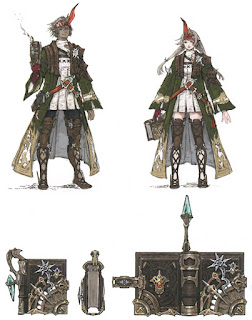Thinking about ways characters might acquire goods in a D&D campaign with
more altruistic assumptions than your standard mercenary fare . Hunting and logging are good possibilities, but I feel like they are pretty easy to model using existing rules (Find A Certain Monster, Go To A Location And Retrieve Object are time honored D&D tasks).
Fishing, on the other hand, is a little bit harder to model interestingly. I think there’s a lot of potential in making it tense, especially since it is time consuming, but much of D&D games take place with random monster encounters looming over the player’s heads. Anyways, here’s a stab at it.
Anyone can fish. For each turn you spend fishing at a regular spot with standard gear, you have a 1 in 6 chance of hooking a fish. Certain spots and certain baits are better than others and afford better odds of catching something. Fishing spots deep in dungeons tend to have rarer and more valuable fish (multiply the dungeon level by the base value of the fish to determine how much gp it is worth). If you take a fish back to town while it’s still fresh, you can tin it, letting you build up a stock of imperishable rations without needing to special order them.
Once you hook a fish, roll 5 six-sided dice and check to see if they match any of the following categories:
Two of a kind: d12 gp, 1 ration
Three of a kind: d20 gp, 2 rations
Four of a kind: d100 gp, 4 rations
Full House: 2d100 gp, 8 rations
Small Straight: d1000 gp, 10 rations, can be used as an alchemical ingredient
Large Straight: a random consumable magic item
All of a Kind: a Speaking Fish, will grant a Limited Wish if you let it go.
If you rolled one of the above categories, you can immediately reel in and catch a fish of the corresponding size and quality, or you can reroll in hopes of getting a better result and a correspondingly larger fish. However,
- the quality of your fishing pole limits the number of rerolls you get before it breaks, and if your final roll when reaching that limits doesn’t result in a catch, your fishing pole breaks.
- you can only reel in the highest category you’ve gotten this fishing attempt. If you pass up on a Full House, you can’t reel in a Two of a Kind on your next reroll.
A single fishing attempt takes 1 Turn, no matter how many rerolls you use.
FISHING POLES
Bamboo Stick: 3 rolls
Hickory Rod: 4 rolls
Alchemically Treated: 5 rolls
Almighty Dragon Fishing Rod: 6 rolls
Fisher God’s Favorite Rod: 7 rolls
I am always looking for ways to simplify or replace Vancian magic. It is hard to explain, and while I like it quite a bit, it reflects a very particular kind of fantasy that my games very rarely draw on. For Idyllic D&D, I’d want something more like Dianna Wynne Jones’s magic: friendler, more common, more whimsical, less earth-shaking. Loosely based off of
this old class.
WITCH
 |
| from final fantasy 14 |
HP, XP, Saving Throws, and Equipment Restrictions as Magic-user.
You have Witchery dice equal to your level. When you cast a spell, you can roll as many as you like; the more dice you roll, the more powerful the spell.
- For each die that comes up a 6, remove a Witchery die from your dice pool until you take a long rest.
- Count each die that comes up 1. If the number of 1s exceeds half your level rounded down, the spell goes wrong or fails to take affect.
Spells
You start with 2 spells of your choice and gain another every even level. You can learn more, but must learn them from (rare) books or (grudging) tutors.
Wonderwork
Complete in an instant any task a barehanded person could complete in a number of Turns equal to the number of Witchery dice rolled. Creatures can make a saving throw to resist if the spell affects them.
Creation
Create objects worth a total of 10 × number of Witchery dice rolled in gold pieces. If you are Lawful, they vanish at midnight. If you are Chaotic, they vanish at noon.
Pyromancy
Ignite, extinguish, or move a flame that fits within a number of cubic feet equal to Dice. If used offensively, damage dealt equals the sum of Witchery Dice rolled, and targets may save for half damage.
Polymorph
Transform into a 1 HD animal for a number of Turns equal to Witchery dice rolled.
Pact
Compels a creature with HD equal to or less than Witchery dice rolled to obey the letter of a promise it is making to you.
Darkness
Extinguish all artificial lights in earshot. Cannot be reignited for a number of Turns equal to Witchery dice rolled.
Anemurgy
Control the direction and intensity of the wind in a mile radius for a number of Turns equal to Witchery dice rolled.
Windwalk
This spell transforms the caster into a whirlwind and transports them a number of miles equal to Witchery dice rolled before transforming them back.
Ghost Mail
Deliver an object light enough you can carry it with one hand to a person or place within a number of Miles equal to number of Witchery dice rolled.
Waterbreathing
The caster and everyone they touch at time of casting can breathe underwater for a number of Turns equal to Witchery dice rolled.




